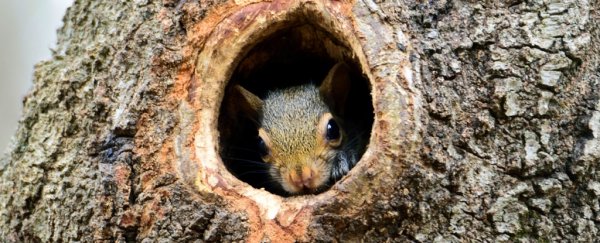An incredibly rare degenerative brain disease has killed a man in New York after he ate squirrel brains, according to a new case study.
The man, a 61-year-old hunter, was taken to hospital in 2015 with symptoms of psychosis, schizophrenia, and cognitive decline, and an impaired ability to walk. Within five months, he was dead.
Brain scans revealed the man had likely contracted a rare variant form of Creutzfeldt-Jakob disease (CJD), which is the most common form of transmissible spongiform encephalopathies (TSEs) – a category of progressive, fatal conditions in which misshapen prions wreak havoc in the brain.
The specific type of disease the man is thought to have had is called Variant Creutzfeldt–Jakob disease (vCJD), which has only been diagnosed a few hundred times, primarily in the UK, although it is distinct from the related TSE, bovine spongiform encephalopathy (aka mad cow disease).
Despite the rareness of all these conditions, researchers with Rochester Regional Health in New York encountered an unusually high incidence (four cases) of suspected TSEs in late 2017 through to early 2018.
This prompted them to review other suspected cases from 2013 on, searching within the records of the Rochester hospital system.
Of five cases they turned up, only three could be confirmed as CJD.
Aside from the 61-year-old hunter – suspected to have contracted the disease from the ingestion of the brains of hunted squirrels – one of the confirmed CJD patients may have been infected via blood-work related to gynaecological surgery, the researchers hypothesise.
In the case of the hunter, vCJD hasn't been actually confirmed as yet, as the researchers would need to test his brain tissue to verify the exact form of CJD (they are currently trying to obtain permission to do this).
While we can't be 100 percent sure it was contaminated squirrel brains that infected the man, as Live Science reports, his family did indicate to the hospital that he ate squirrel brains.
While squirrel brains are not a foodstuff for most of us, in some parts of the US they are considered a delicacy – albeit one that was linked to the risks of CJD more than 20 years ago.
A study in The Lancet made this association in 1997, in a paper observing squirrels were a popular food in rural Kentucky, including their brains.
"Those who eat only squirrel meat chop up the carcass and prepare it with vegetables in a stew called burgoo," a related report in The New York Times explained.
"Squirrels recently killed on the road are often thrown into the pot."
According to these accounts, squirrel brain eating is part of a Kentucky ritual, in which the head of the animal is presented as a gift to the matriarch of the family, who shaves the fur off the head, and fries it whole.
At the dinner table, the skull is cracked open, and the brains are sucked out.
If the above time-honoured traditions are something you still observe in your own family's household, perhaps you should consider stopping - this tragic medical case is just the latest indication as to why.
The findings were presented at IDWeek 2018, the annual meeting of the Infectious Diseases Society of America and other organisations, held in San Francisco earlier in the month.
